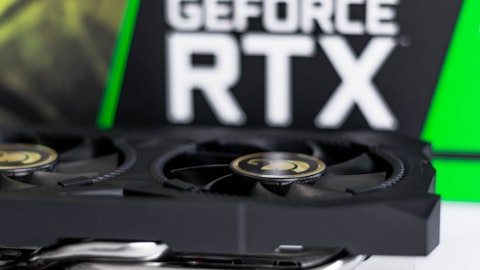We came across a bullish thesis on The Boeing Company (BA) on Johnson Equity Analysis’s Substack by Kyler Johnson. In this article we will summarize the bulls’ thesis on BA. BA Technologies, Inc. share was trading at $155.55 as of Sept 16th.

A Boeing 737 aircrafts parked in an airport terminal with passengers awaiting to board.
Boeing (BA) operates as one of the two dominant players in the global aerospace industry, producing commercial jetliners and defense systems. The company is divided into three core segments: Commercial Airplanes (BCA), Defense, Space & Security (BDS), and Global Services (BGS). Boeing’s strength lies in its formidable moat, as it operates in a near duopoly with Airbus, which makes entry into the market nearly impossible for new competitors. With a substantial backlog of over 6,250 planes, Boeing’s commercial segment alone guarantees nearly a decade’s worth of revenue, even without new orders, which are likely to continue flowing.
The industry’s outlook is stable, with military spending expected to grow around 3.5% annually, while Boeing’s Global Services division has been growing at 4.5% per year, which is indicative of reliable growth prospects. Boeing’s historical median free cash flow (FCF) margin of 6.86% outperforms Airbus’s 4.22%, showcasing a stronger profitability base. In terms of returns, Boeing’s return on invested capital (ROIC) is an impressive 32.9%, compared to Airbus’s 15%, demonstrating Boeing’s efficiency in generating profits from its capital. However, Boeing carries significant debt, holding $16 billion in cash against $52.3 billion in long-term debt, though its peak FCF of nearly $14 billion could make this manageable once financial conditions normalize.
The company’s management has faced criticism for past missteps, particularly regarding quality issues and executive compensation. Notably, Boeing’s FCF margin, which peaked at 13.9% in 2018, turned negative in subsequent years due to quality control problems and leadership failures. However, a leadership transition is underway, with aerospace veteran Robert Ortberg set to take over as CEO, potentially marking a turning point for the company.
Despite Boeing’s current challenges, the company’s recovery is likely. Positive free cash flow returned in 2022 and 2023, although quality issues have caused short-term setbacks. With the integration of Spirit AeroSystems expected to enhance vertical integration, Boeing could see improvements in operational efficiency over the long term. Based on projected revenue and a recovery in deliveries, the company could achieve a share price of $420.70 by 2029, implying a 130% return, making Boeing a compelling long-term investment.
The Boeing Company is also not on our list of the 31 Most Popular Stocks Among Hedge Funds. As per our database, 42 hedge fund portfolios held BA at the end of the second quarter which was 54 in the previous quarter. While we acknowledge the risk and potential of BA as an investment, our conviction lies in the belief that some AI stocks hold greater promise for delivering higher returns, and doing so within a shorter timeframe. If you are looking for an AI stock that is more promising than BA but that trades at less than 5 times its earnings, check out our report about the cheapest AI stock.
READ NEXT: Analyst Sees a New $25 Billion “Opportunity” for NVIDIA and 10 Best of Breed Stocks to Buy For The Third Quarter of 2024 According to Bank of America.
Disclosure: None. This article was originally published at Insider Monkey.



